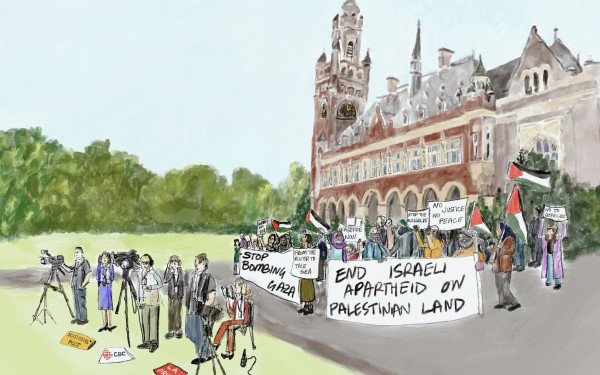Downsized but not Downtrodden
Thousands Take to the Streets to Express Dissatisfaction with Public Broadcast Cuts
A sea of red, white and blue flags emblazoned with the Radio-Canada logo flooded the streets of Montreal on Sunday afternoon, as over 25,000 people marched to protest recent budget cuts to CBC and Radio-Canada.
Organized by Amis de Radio-Canada, a volunteer organization aimed at defending Canadian programming, the protest denounced government funding cuts to CBC/Radio-Canada and expressed concern on the real cost of the issue.
Chanting “Radio-Canada, c’est à vous, c’est à nous, c’est à toi, c’est à moi!” meaning “It’s yours, it’s ours, it’s yours, it’s mine,” protesters made it clear they believe government budget cuts pose a huge threat to democracy and inhibit the public from having a voice on the radio.
Cheering, singing, air horns and whistles echoed throughout the city as impassioned CBC listeners of all ages marched from Square Victoria to the Radio-Canada headquarters on René-Lévesque Blvd.
“[The protest is] important because Radio-Canada is a public service that is an instrument of culture and an important democratic platform,” said Kamel Bouleboudjen, a volunteer for the event. “When you take away from a public service, it’s democracy that will suffer.”
The Conservative government has cut over $115 million from CBC/Radio-Canada’s spending since 2012.
“It’s because Radio-Canada is not a program that’s in Harper’s pocket,” said protester Guy Poulin. “If it was […] someone who was in complete accordance with the government, Radio-Canada wouldn’t have been cut.”
In response to the cuts, CBC will eliminate 20 per cent of its employees over the next five years and reduce its office space in Montreal and Toronto.
CBC/Radio-Canada has not had a budget increase since 1973.
“We need CBC/Radio-Canada,” said Pierre Maisonneuve, a spokesperson for the protest and retired employee of Radio-Canada. “We needed it in 1936 and we need it more and more in 2014. Radio-Canada is owned by the people and it’s for the people.”
The protest, which lasted about three hours, reached the Radio-Canada headquarters around 1:20 p.m., where organizers took to the stage to denounce the lack of government funding and emphasize the importance of CBC/Radio-Canada for Canadian democracy.
“We are here for democracy and to defend our culture,” said Nicolas Bédard, the organizer of the protest’s Facebook group.
Even the character Dame Plume from 1970s Radio-Canada TV show La Ribouldingue showed up to voice her concern over the closure of the costume department, which would result in the loss of hundreds of costumes, many of which represent important pieces of Quebec’s cultural history.
Protester Chantel Champagne said that the costumes stored by the CBC are synonymous with preserving culture, and that eliminating the sector would “take away all of the richness, all of the history, all of the youth of Radio-Canada.”
Many protesters were also concerned about the effect the cuts might have on Francophone culture.
“I believe that it’s the quality that will definitely suffer,” said Francine LaCoste, who came to show her support for CBC/Radio-Canada. “I think it will be very damaging for artists, like the costumiers that lost their jobs not too long ago and to this culture that has been building for such a long time.”
LaCoste, like many others, explained how CBC has played a constant and important role in her life, “When I was little I would listen to Radio-Canada with my mom, so I was surrounded by Radio-Canada all of my childhood, my teenage years, my life as a young adult, and still now.”
Many protesters criticized Radio-Canada’s President, Hubert Lacroix, and his close relationship with the Prime Minister.
Protester Andre Emond said that one of the most important steps going forward “would be to dissociate political power from Radio-Canada.” Emond is worried that Radio-Canada’s president is more concerned with political power than the quality of the media outlet.
Last year CBC lost the broadcasting rights for Hockey Night in Canada to Rogers, representing another obstacle for the organization.
Protests also took place in Gaspé, Matane, Moncton, Quebec City, Rimouski, Saguenay, Sherbrooke, Sept-Îles, and Trois-Rivières on Sunday.
Organizers of the event hoped that this citizen initiative would help shed light on the issue for the rest of the country.
“It’s not a pipeline we need to unite us,” cried one protester as the mass gathered outside of the CBC/Radio-Canada building, “it’s a strong Radio-Canada.”

1_900_600_90.jpg)
3_900_600_90.jpg)
4_900_619_90.jpg)

2_600_375_90_s_c1.jpg)
_600_375_s_c1.png)
